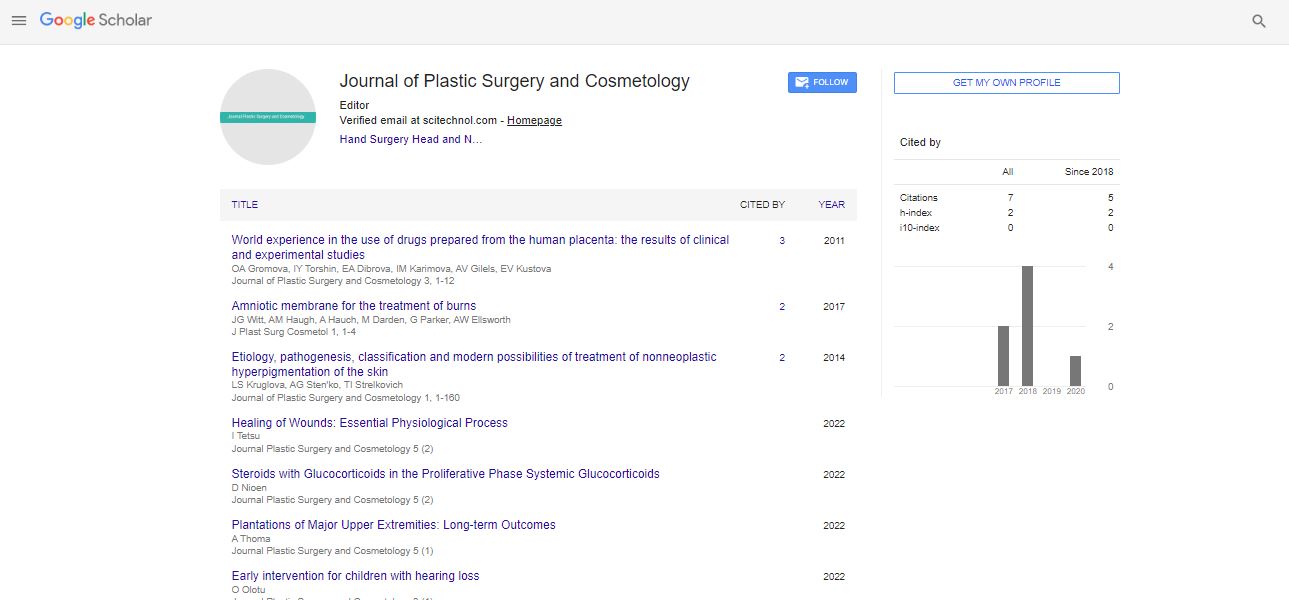Opinion Article, J Pls Sur Cos Vol: 12 Issue: 4
Artificial Intelligence in Plastic Surgery: Transformative Applications in Pre-Operative Planning, Surgical Navigation, and Outcome Prediction
Timothy Yeniko*
1Department of Plastic and Reconstructive Surgery, Keck University, Los Angeles, USA
*Corresponding Author: Timothy Yeniko,
Department of Plastic and
Reconstructive Surgery, Keck University, Los Angeles, USA
E-mail: Yenikotimothy4872@gmail.com
Received date: 27 November, 2023, Manuscript No. JPSC-24-123951;
Editor assigned date: 29 November, 2023, Pre QC No. JPSC-24-123951 (PQ);
Reviewed date: 14 December, 2023, QC No. JPSC-24-123951;
Revised date: 21 December, 2023, Manuscript No. JPSC-24-123951 (R);
Published date: 28 December, 2023, DOI: 10.4172/JPSC.1000069
Citation: Yeniko T (2023) Artificial Intelligence in Plastic Surgery: Transformative Applications in Pre-Operative Planning, Surgical Navigation, and Outcome Prediction. J Pls Sur Cos 12:4.
Description
Artificial Intelligence (AI) has emerged as a revolutionary force in healthcare, offering transformative possibilities across various medical specialties. In this field of plastic surgery, AI holds great promise in enhancing pre-operative planning, surgical navigation, and outcome prediction. This essay investigates the potential applications of artificial intelligence in plastic surgery, exploring how advanced technologies can contribute to more precise procedures, improved patient outcomes, and a deeper understanding of surgical interventions.
One of the key applications of AI in pre-operative planning is image analysis and the generation of 3-Dimensional (3D) models. AI algorithms can analyze medical imaging data, such as CT scans or MRIs, to create detailed 3D reconstructions of a patient's anatomy. This allows plastic surgeons to visualize and plan procedures with unprecedented accuracy, gaining insights into the spatial relationships among structures.
AI-driven facial recognition technology plays a pivotal role in preoperative planning, particularly in aesthetic procedures. By analyzing facial features and proportions, AI algorithms can assist surgeons in developing personalized treatment plans that align with a patient's unique anatomy. This technology aids in predicting the likely outcomes of procedures and ensures a more tailored and harmonious approach to facial surgeries.
AI-driven Virtual Reality (VR) simulations enable surgeons to immerse themselves in a virtual environment where they can simulate and practice procedures. This technology provides a risk-free space for surgeons to refine their skills, experiment with different approaches, and anticipate potential challenges before entering the operating room. VR simulations contribute to increased surgical precision and confidence. Augmented Reality (AR) technologies powered by AI offer real-time guidance during surgery. Surgeons can wear ARheadsets that overlay digital information onto the surgical field, providing vital details about anatomical structures, optimal incision points, and critical landmarks. This enhances surgical precision and reduces the risk of errors, especially in complex procedures where accuracy is paramount.
AI-driven robotic systems are becoming integral to surgical navigation in plastic surgery. These systems, such as the da Vinci Surgical System, can be controlled by surgeons to perform minimally invasive procedures with enhanced precision. The incorporation of AI enables the robotic system to adapt to the surgeon's movements, offering a more intuitive and seamless integration of technology into the surgical workflow. Real-time analysis of intraoperative images is facilitated by AI algorithms, allowing surgeons to make informed decisions during surgery. For example, AI can analyze fluorescence imaging to assess blood flow and tissue viability, aiding in the identification of optimal flap design and reducing the risk of complications in reconstructive procedures. Machine learning algorithms, a subset of AI, can analyze vast datasets to predict surgical outcomes based on patient characteristics, surgical techniques, and postoperative care. By leveraging historical data, these algorithms can provide surgeons with valuable insights into potential complications, expected recovery times, and long-term aesthetic outcomes. AI enables the development of patient-specific risk stratification models, taking into account individual factors such as age, comorbidities, and lifestyle. These models assist surgeons in identifying high-risk patients who may require additional precautions or modified surgical approaches. Personalized risk assessments contribute to enhanced patient safety and improved postoperative outcomes.
AI-driven algorithms can predict postoperative aesthetics by analyzing preoperative images and incorporating factors such as skin elasticity, facial proportions, and symmetry. This predictive capability assists surgeons and patients in setting realistic expectations and choosing procedures that align with the desired aesthetic outcomes. The integration of AI in plastic surgery raises concerns about the privacy and security of patient data. Protecting sensitive medical information from unauthorized access and ensuring compliance with data protection regulations are critical considerations in the development and deployment of AI technologies.
The potential for algorithm bias and limited generalizability is an ongoing challenge. AI models trained on specific demographic groups may not generalize well to diverse patient populations, leading to biased predictions. Ensuring diversity in training data and continuous validation are essential to mitigate these challenges. The successful implementation of AI in plastic surgery requires adequate training for surgeons to understand and leverage these technologies effectively. Overcoming the learning curve and fostering widespread adoption necessitate educational initiatives and collaboration between the medical and technology communities. The potential applications of artificial intelligence in pre-operative planning, surgical navigation, and outcome prediction in plastic surgery mark a paradigm shift in the field. As technologies continue to advance, the integration of AI is poised to become a standard practice, offering benefits such as enhanced precision, improved patient safety, and personalized treatment approaches.
 Spanish
Spanish  Chinese
Chinese  Russian
Russian  German
German  French
French  Japanese
Japanese  Portuguese
Portuguese  Hindi
Hindi 